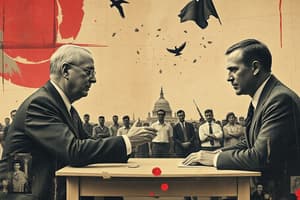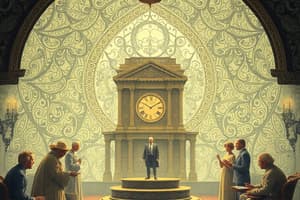Podcast
Questions and Answers
What is the core of politics?
What is the core of politics?
- Elections
- Power sharing
- Public administration
- Decision making (correct)
Which political system is characterized by the ability to remove leaders through a vote of no confidence?
Which political system is characterized by the ability to remove leaders through a vote of no confidence?
- Parliamentary system (correct)
- Democratic system
- Authoritarian system
- Elected monarchy
Which philosopher believed that human nature was inherently full of conflict and evil?
Which philosopher believed that human nature was inherently full of conflict and evil?
- David Hume
- Jean-Jacques Rousseau
- Thomas Hobbes (correct)
- John Locke
What is an example of a public good?
What is an example of a public good?
Which region formed the most new states after the Cold War?
Which region formed the most new states after the Cold War?
What term describes the right of those who are ruling to feel legitimate?
What term describes the right of those who are ruling to feel legitimate?
What is the three-letter acronym for the overall output of the domestic economy, excluding income earned by residents overseas?
What is the three-letter acronym for the overall output of the domestic economy, excluding income earned by residents overseas?
Is a nation always a sovereign state?
Is a nation always a sovereign state?
What concept explains the belief that a country's citizens can influence governmental policy?
What concept explains the belief that a country's citizens can influence governmental policy?
What term describes the transfer of authority from a higher level of government to a lower level?
What term describes the transfer of authority from a higher level of government to a lower level?
Which country is identified as having the lowest Gross National Product (GNP) among the AP6 countries?
Which country is identified as having the lowest Gross National Product (GNP) among the AP6 countries?
In what type of government are civil liberties and civil rights typically highest?
In what type of government are civil liberties and civil rights typically highest?
What does Purchasing Power Parity (PPP) primarily help to compare?
What does Purchasing Power Parity (PPP) primarily help to compare?
What essential factor does a true form of government serve according to Aristotle?
What essential factor does a true form of government serve according to Aristotle?
What characterizes a large N-study in political science research?
What characterizes a large N-study in political science research?
Which statement accurately reflects on how federal and unitary governments differ?
Which statement accurately reflects on how federal and unitary governments differ?
Study Notes
Political Decision Making
- Core of politics revolves around decision making and power.
- Political systems define the context in which politics takes place.
- Parliament serves as a primary location for political decision-making.
State Types and Characteristics
- Totalitarian states exhibit the largest public sphere.
- Eastern Europe and Central Asia emerged as the most new states post-Cold War.
- Countries like Japan are examples of cultural homogeneity.
Philosophical Foundations
- Thomas Hobbes viewed human nature as inherently conflictual and evil.
- John Locke and Rousseau contributed to discussions on the state of nature.
Governance and Political Theory
- Libertarians advocate for minimal government interference in economic and political affairs.
- Legitimacy refers to the accepted right of rulers to govern.
- Sovereignty indicates a nation's self-determination.
Collective and Public Goods
- Public goods exemplify collective goods accessible to all.
Political Systems and Structures
- Adjudication involves judicial processes, such as those conducted by the Supreme Court.
- Parliamentary systems allow the removal of leaders through votes of no confidence.
- Federal systems distribute power between central and regional governments.
Developmental Policies and Political Efficacy
- Economic rights encourage political involvement in developing countries.
- Political efficacy reflects the belief in a country’s ability to influence policy.
Religious and Cultural Aspects
- Christianity is the most widespread religion globally.
- Religious fundamentalism emphasizes the importance of sacred texts.
Economic Indicators
- GDP (Gross Domestic Product) measures the domestic economy's overall output.
- Purchasing Power Parity (PPP) helps compare currencies by adjusting for living standards.
- Industrialized countries tend to experience lower population growth.
Civil Rights and Liberties
- Democratic states typically uphold the highest levels of civil liberties and rights.
Governance Perspectives
- Aristotle suggested that true governance benefits the populace.
- Outputs pertain to the effects resulting from policies implemented.
Social and Economic Conditions
- Countries affected by repression, post-war aftermaths, wealth, and high economic growth face stability challenges.
- Nigeria is noted for having a lower national product among the AP6 group of countries.
Research Methodology
- Large N-studies analyze numerous countries/variables, enhancing the robustness of findings.
Political Structures Comparison
- Russia and other nations experienced shifts toward increased political freedom post-communism.
- The contrast between federal and unitary systems reflects varying degrees of regional power.
FRQ Topics
- Explore the impact of globalization on political and economic relationships.
- Analyze how two countries can share structural similarities but have different functional outcomes.
Studying That Suits You
Use AI to generate personalized quizzes and flashcards to suit your learning preferences.
Description
Test your knowledge on the core concepts of politics, including political systems, decision-making processes, and major theories. This quiz covers essential terms such as totalitarian states and public goods, along with influential thinkers like Thomas Hobbes. Perfect for students of political science.




